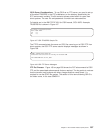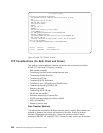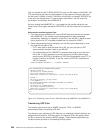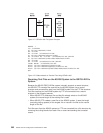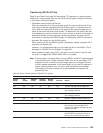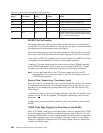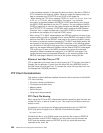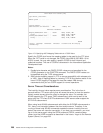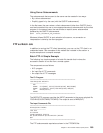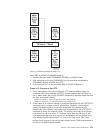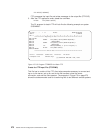
Table 25. CCSID Code Page Tagging for New AS/400 Files
Receiving File
System
FTP Transfer Type
TYPE A (ASCII) TYPE C (‘ccsid’) TYPE E (EBCDIC) TYPE I (Image/Binary)
QSYS.LIB Related default
EBCDIC CCSID of
FTP default ASCII
CCSID.
If conversion table,
then 65535.
‘ccsid’ if EBCDIC
CCSID. If ccsid is
ASCII, then related
default EBCDIC
CCSID.
65535 65535
QDLS, QOPT, and
other HFS file
systems
Not supported Not supported Not supported Not assigned by FTP
“root,” QOpenSys Code page of default
ASCII CCSID
‘ccsid’ value specified
in TYPE C ccsid#
subcommand.
Code page of Job
CCSID if it is not
65535. If Job CCSID
is 65535, assign code
page of Default Job
CCSID.
Code page of default
ASCII CCSID.
QLanSrv ASCII code page of
the network server
description for file
directory.
ASCII code page of
the network server
description for file
directory.
Not supported ASCII code page of
the network server
description for file
directory.
Note:
The default ASCII CCSID is defined when the FTP job is started: For the client, the CCSID parameter of the
STRTCPFTP (and FTP) command. For the server, the CCSID parameter of the FTP Configuration attributes which
can be changed using the CHGFTPA command.
QFileSvr.400 file assignments depend on the file system receiving the file.
See
Character Data Representation Architecture
, SC41-1390 for additional information
When using TYPE C ccsid#, the data transferred must be in the ccsid# specified. No data conversion occurs when
transferring data using TYPE C transfer option.
National Language Support Considerations for FTP
Be aware of the following when using FTP in an environment with different primary
languages.
v When data is transferred using TYPE E (or EBCDIC) the data is stored as is and
therefore will be in the EBCDIC code page of the file that it came from. This can
result in the stored file being tagged with an inappropriate CCSID value when the
primary language of the two AS/400 systems is different.
For example, when data in code page 273 is sent using TYPE E to the
QSYS.LIB file system on a machine where the file does not exist, the data is
stored as is in a new file tagged with CCSID 65535. If the receiving file already
exists, then the data will be received as is and tagged with the existing file
CCSID which may not be 273.
To avoid incorrect CCSID tagging, you can use the TYPE C
CCSID
subcommand
(for example, TYPE C 273) to specify the CCSID of the data being transferred.
When a CCSID is specified on a transfer and the data is written to an existing
file, the data is converted to the CCSID of the existing file. If no target file exists
before the transfer, a file is created and tagged with the specified CCSID.
Chapter 7. File Transfer Protocol (FTP) Client 265



